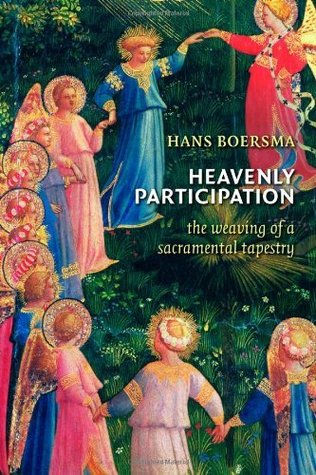More on this book
Kindle Notes & Highlights
by
Hans Boersma
Started reading
November 20, 2017
Propositional truth, once a hallmark of evangelicalism, is making way for more elusive means of expression, such as narrative, image, and symbol. Postmodern
Once modernity abandoned a participatory or sacramental view of reality, the created order became unmoored from its origin in God, and the material cosmos began its precarious drift on the flux of nihilistic waves.3
Throughout this book I will make the argument that when we abandon Augustine by turning created realities from objects of penultimate interest into objects that have ultimate importance, we ironically end up losing their significance.
The "sacramental tapestry" of the subtitle speaks of a carefully woven unity of nature and the supernatural,
God. In that sense, created matter is meant to serve...
This highlight has been truncated due to consecutive passage length restrictions.
The purpose of all of matter, as I have already mentioned, is to lead us into God's heavenly presence, to
beginning of the cosmic restoration.
I have become convinced that a common rediscovery of the depths of the Great Tradition will, as a matter of course, lead to genuine rapprochement between evangelicals and Catholics.
Catholic theologians and artists tend to emphasize the presence of God in the world, while the classic works of Protestant theologians tend to emphasize the absence of God from the world.
sacramental ontology not just in the Reformation but also in Catholicism. Unfortunately, I will argue, neither side of the Ref...
This highlight has been truncated due to consecutive passage length restrictions.
Henri de Lubac
Jean Danielou
ressourcement, its return to the broad consensus of the fathers and the Middle Ages - that is, the Great Tradition.31
What Leo's encyclical did was entrench Thomist philosophy and theology as the one normative system of Catholic thought.
by reintegrating nature and the supernatural, the
two realms that the Neo-Thomist Scholastics
Platonist-Christian synthesis a sacramental ontology that they believed had been lost through the modern separation between nature and the supernatural. As a result, nouvelle
acceptance of postmodernity among younger
common (public)
Great Tradition of the church
Great Tradition.
understanding of reality)
that the mysterious character of all created reality lies in its sacramental nature. In fact, we would not go wrong by simply equating mystery and sacrament.
Dave Cox II liked this
For Lewis, a sacramental relationship implies real presence.
subsists or participates in God.
forms the underlying ontological basis that makes it possible for a covenant relationship to
When we talk about "real presence," we tend to think in terms of eucharistic theology, and we ask the question: Is Christ really present in the Eucharist (the sacramentalist position), or is the celebration of the Lord's Supper an ordinance in which we remember what Christ did
Saint Anselm
Modern theology's problem is its rational confidence - and thus, ultimately, its pride.
Therefore, there is a growing sense that we need a healthy dose of mystery to counter sterile intellectualism.
danger of confusing postmodern skepticism with mystery.
a denigration and commodification of the created order, in this case of the human body.
But the Christian twist on things is that we dare not assign it ultimate significance. C. S. Lewis puts it this way:
Spirit - is to be enjoyed. Only
This point is important because it is precisely by celebrating created realities for their own sake (frui) that we unhinge them from their grounding in the eternal Word or Logos of God. Unhinged from their transcendent
predicated on its participat...
This highlight has been truncated due to consecutive passage length restrictions.
Maximus the Confessor
Only God is to be enjoyed for his own sake, and creation has no more than a sacramental participation in the life of God.
High Middle Ages.
I want to emphasize that, in many ways, the angelic doctor still continued the synthesis between Christianity and (other-worldly) Platonism.
D...
This highlight has been truncated due to consecutive passage length restrictions.


